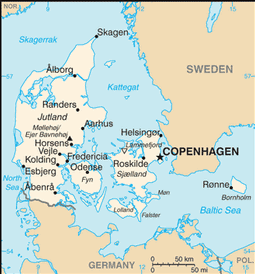Denmark
 Denmark is country of Europe located in north Europe.
Denmark is country of Europe located in north Europe.
Details
| Official Name: | Kingdom of Denmark |
| Capital: | Copenhagen |
| Total area: | 42 915 km2 |
| GDP per capita: | $37,657 |
| Native Language: | Danish |
| Government: | Unitary parliamentary Constitutional monarchy |
| Population: | 5,580,413 |
| Major Religion: | Lutheran Church of Denmark |
| Monetary Unit: | Danish krone (DKK) |
Denmark consists of the peninsula of Jutland (Jylland) and some 400 named islands. Of these, 82 are inhabited, the largest being Funen (Fyn) and Zealand (Sjælland).
Denmark has a large fishing industry, and possesses a merchant fleet of considerable size. The manufacturing sector’s main areas of activity include food products, chemicals, machinery, metal products, electronic and transport equipment, beer and paper and wood products. Tourism is also an important economic activity.
Between the 8th and 11th centuries, the Danes were known as the Vikings. Together with the Norwegians and Swedes, they colonised, raided and traded in all parts of Europe. Modern-day Danes pride themselves on their country’s welfare state with its widespread social protection for everyone.
Denmark is a constitutional monarchy, ruled today under the 1953 constitution. The single-chamber parliament or Folketing has 179 elected members.
Among the best-known Danes are the writer Hans Christian Andersen, famous for his fairy tales, the author Karen Blixen and the designer Arne Jacobsen. Danish cinema has gained international recognition thanks largely to the experimental film director Lars von Trier.
Specialities of Danish cooking include smørrebrød (open sandwiches), boiled or sugar browned potatoes, boiled red cabbage, roast pork and roast duck.
Health & Welfare
Denmark enjoys one of the highest living standards in the world. Outstanding health and welfare system.
Economy & Jobs
Agriculture, fishing, mining, manufacturing, energy, service industry, and transportation.
Main Attractions
Copenhagen, Egeskov Castle, Legoland theme park, and Ribe town (oldest in Scandinavia).
Economy
Denmark has a modern, prosperous and developed mixed market economy, ranking 21st in the world in terms of GDP (PPP) per capita and 10th in nominal GDP per capita. A liberalization of import tariffs in 1797 marked the end of mercantilism and further liberalization in the 19th and the beginning of the 20th century established the Danish liberal tradition in international trade that was only to be broken by the 1930s. Property rights have enjoyed strong protection. Denmark's economy stands out as one of the most free in the Index of Economic Freedom and the Economic Freedom of the World. The economy has high levels of international trade and Denmark is known as a free trade advocate in the European Union. Denmark is one of the most competitive economies in the world according to World Economic Forum 2008 report, IMD and The Economist.
As a result of its acclaimed flexicurity
model, Denmark has the most free labour market in Europe, according to the World Bank. Employers can hire and fire whenever they want (flexibility), and between jobs, unemployment compensation is very high (security). The World Bank ranks Denmark as the easiest place in Europe to do business. Establishing a business can be done in a matter of hours and at very low costs. Denmark has a competitive company tax rate of 25% and a special time-limited tax regime for expatriates. The Danish taxation system is broad based, with a 25% VAT, in addition to excise taxes, income taxes and other fees. The overall tax burden (sum of all taxes, as a percentage of GDP) is estimated to be 46% in 2011.
Immigration and residency
If you are interested in moving to the countries, either with a residence permit or by acquiring a citizenship, please contact us, and also get acquainted with the relevant migration documents.